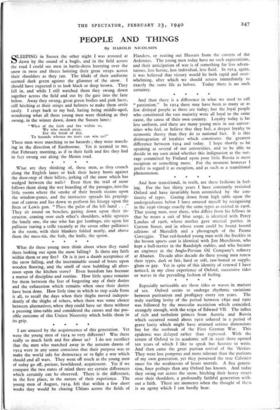And then there is a difference in what we used
to call " patriotism." In 1914 there may have been as many or as few disloyal people as there are today; but the loyal people who constituted the vast majority were all loyal to the same cause, the cause of their own country. Loyalty today is far less uniform, and there are many young men in our univer- sities who feel, or believe that they feel, a deeper loyalty to economic theory than they do to national fact. It is this disintegration of loyalties which constitutes the greatest difference between 1914 and today. I hope shortly to be speaking at several of our universities, and to be able to decide in my own mind whether this indignation at the out- rage committed by Finland upon poor little Russia is mere escapism or something more. For the moment however I prefer to regard it as escapism, and as such as a transitional phenomenon.
* * * *






































 Previous page
Previous page